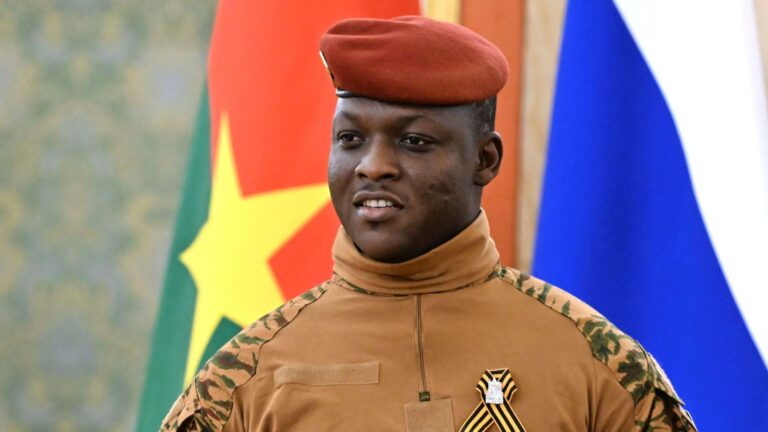The security situation in Burkina Faso continues to deteriorate rapidly, with growing evidence that the country’s transitional leader, Captain Ibrahim Traoré, is increasingly resorting to desperate measures to maintain control. Amid escalating violence, expanding insurgent territory, and mounting public frustration, observers say the military-led government is struggling to contain a crisis that has pushed the nation to the brink.
Since taking power in a September 2022 coup—Burkina Faso’s second that year—Captain Traoré vowed to restore stability and reclaim territory lost to Islamist militants. However, nearly two years into his leadership, large swaths of the country remain under the control of armed groups linked to al-Qaeda and the Islamic State. Entire communities have been cut off, thousands have been killed or displaced, and the once-vibrant rural economy has been left in ruins.
In recent months, the government has intensified military operations across the north and east of the country, deploying both regular forces and civilian auxiliaries, known locally as Volunteers for the Defense of the Homeland (VDPs). These groups are often undertrained and poorly equipped, raising concerns about their ability to counter sophisticated insurgent networks. While some military successes have been reported, the gains are often temporary, with insurgents returning after government forces withdraw.
Facing criticism for the lack of progress, Traoré has doubled down on militarized rhetoric, urging citizens to support what he has framed as a national liberation struggle. In speeches and televised addresses, he has called for unity and sacrifice, portraying the fight against jihadist violence as a patriotic duty. But behind the public appeals lies a government that appears increasingly cornered—resorting to censorship, repression, and tighter control over dissent.
Human rights groups have reported an uptick in arrests of journalists, activists, and civil society members who criticize the government’s handling of the security crisis. Independent media outlets have faced suspensions, while internet blackouts and information restrictions are becoming more common, especially in regions affected by military operations. Analysts argue that these tactics are aimed at controlling the narrative and concealing the true scale of the humanitarian and security breakdown.
Reports from the ground paint a dire picture. More than two million people have been displaced since the conflict began, with many living in overcrowded camps lacking basic services. Dozens of towns and villages remain under de facto siege, with residents facing acute shortages of food, water, and medicine. In some areas, humanitarian access has been impossible for months, leaving civilians at the mercy of armed groups.
Despite these conditions, Traoré has continued to position himself as a revolutionary figure, appealing to pan-Africanist ideals and seeking support from like-minded regimes in the region. Burkina Faso’s alliance with Mali and Niger—both led by military juntas—has been presented as an alternative to Western-backed governance models. Together, these three countries have formed the Alliance of Sahel States, a bloc aimed at mutual defense and political coordination.
Critics, however, argue that the alliance serves more as a political shield than a meaningful security solution. The insurgent threat in the Sahel remains fluid and transnational, exploiting borders and weak state institutions to expand their reach. Military-only responses, they warn, will not address the deeper grievances fueling the conflict, including marginalization, poverty, and lack of government presence.
International partners have also voiced concern over Burkina Faso’s direction. Several Western donors, including the European Union and France, have reduced aid or withdrawn military cooperation due to tensions with the junta. At the same time, the government has turned to new partners such as Russia for military assistance, raising further questions about the country’s geopolitical trajectory.
Domestically, there are signs of growing fatigue among the population. While many initially supported the military’s promises of restoring order, the worsening humanitarian situation has led to disillusionment. Public demonstrations have been rare, largely due to government crackdowns, but voices of dissent are beginning to re-emerge, especially among displaced communities and youth organizations.
Traoré’s government has yet to outline a clear timeline for a return to civilian rule, despite pressure from regional blocs like the Economic Community of West African States (ECOWAS). With no elections in sight and the crisis deepening, some fear that the country is sliding into an extended period of instability, with the military unable to deliver either security or democratic transition.
As Burkina Faso continues to unravel, the burden on ordinary citizens grows heavier by the day. Without a shift in strategy that includes meaningful dialogue, inclusive governance, and humanitarian relief, experts warn that the conflict will only intensify. For now, Captain Ibrahim Traoré remains at the helm of a nation in distress, relying on increasingly desperate tactics to hold power in a battle he may not be able to win.

